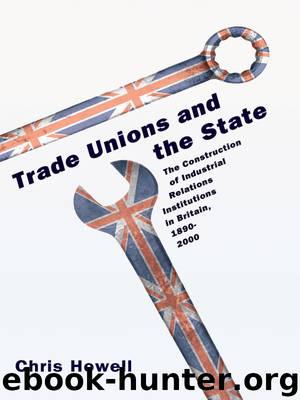Trade Unions and the State by Howell Chris;

Author:Howell, Chris;
Language: eng
Format: epub
Publisher: Princeton University Press
Published: 2009-03-17T16:00:00+00:00
EVALUATING INDUSTRIAL RELATIONS REFORM
Any evaluation of the industrial relations of the 1970s inevitably focuses on industrial conflict, incomes policies, and a series of set-piece battles between the labor movement and the state. This period is understood to represent a failure of industrial relations; certainly the period of the Social Contract between the 1974–79 Labour government and the trade unions, and the “Winter of Discontent” of 1978–79, traumatized both the Labour Party and the unions, setting in motion the transformation of the party into today’s New Labour Party and permitting Margaret Thatcher’s Conservative Party to win power on a platform of industrial relations reform. Nevertheless, as the remainder of this chapter suggests, while industrial relations reforms during this period can be considered a political failure, they were an institutional success, and it is this process of institution-building that needs attention if one is to understand the shape and outcome of the future reform efforts that created the third system of industrial relations after 1979. For that reason, this chapter passes over the well-known story of failed incomes policies and public-sector strikes to examine the emergence of decentralized industrial relations institutions, primarily in the private sector.
This period saw a marked increase in the degree of state intervention. Efforts to limit and control strikes were the most trumpeted and visible elements of those interventionist efforts. Less visible, but much more important and successful, however, was the effort to reconstruct Britain’s system of industrial relations, retaining the first system’s emphasis on the necessary role of trade unions and permanent collective bargaining institutions in the regulation of relations between business and labor, but shifting away from industry-level bargaining toward the workplace, which was the site of conflict over the process of economic restructuring, and simultaneously expanding the scope of collective regulation to include the organization and nature of work.
In the second system, state intervention operated through legislation, incomes policies, and, once again, its management of public-sector industrial relations (for example, general agreements in local government in 1969 and the health service in 1971 recognized shop stewards114), and it encouraged a decentralization of bargaining indirectly through strengthening the capacities of trade unions inside the firm. The British state did not, for the most part, create this new set of industrial relations institutions; as the Donovan report noted, they were already being constructed in some firms and some sectors of the economy. Instead the role of the state during this period was to accelerate changes in industrial relations practices that were occurring naturally, and to spread those changes from a few advanced sectors to the rest of the economy. This required that the state overcome resistance to this evolution, particularly from trade unions. Whereas in the early decades of the twentieth century it was employer resistance to trade unionism and collective actions problems facing employers in highly competitive industries that required the attention of the state, in this period it was the trade unions that initially needed to be persuaded of the virtues of decentralized collective bargaining.
Download
This site does not store any files on its server. We only index and link to content provided by other sites. Please contact the content providers to delete copyright contents if any and email us, we'll remove relevant links or contents immediately.
International Integration of the Brazilian Economy by Elias C. Grivoyannis(76518)
The Radium Girls by Kate Moore(11651)
Turbulence by E. J. Noyes(7733)
Nudge - Improving Decisions about Health, Wealth, and Happiness by Thaler Sunstein(7273)
The Black Swan by Nassim Nicholas Taleb(6793)
Rich Dad Poor Dad by Robert T. Kiyosaki(6206)
Pioneering Portfolio Management by David F. Swensen(6093)
Man-made Catastrophes and Risk Information Concealment by Dmitry Chernov & Didier Sornette(5687)
Zero to One by Peter Thiel(5517)
Secrecy World by Jake Bernstein(4420)
Millionaire: The Philanderer, Gambler, and Duelist Who Invented Modern Finance by Janet Gleeson(4127)
The Age of Surveillance Capitalism by Shoshana Zuboff(4007)
Skin in the Game by Nassim Nicholas Taleb(3993)
The Money Culture by Michael Lewis(3873)
Bullshit Jobs by David Graeber(3860)
Skin in the Game: Hidden Asymmetries in Daily Life by Nassim Nicholas Taleb(3744)
The Dhandho Investor by Mohnish Pabrai(3581)
The Wisdom of Finance by Mihir Desai(3542)
Blockchain Basics by Daniel Drescher(3345)
